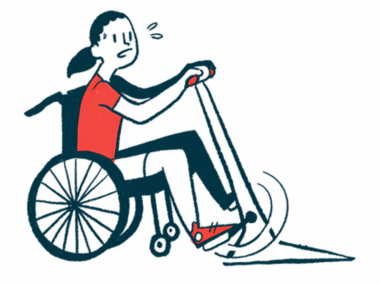#ECTRIMS2019 – Early Ocrevus Use Slows Disability in PPMS, Including Risk of Wheelchair Reliance
Written by |

Early and continuous treatment with Ocrevus (ocrelizumab) leads to a greater and more durable slowing of disability progression — seen for up to 6.5 years — in people with primary progressive multiple sclerosis (PPMS), according to long-term data on its use in PPMS patients in a Phase 3 main and extension study.
Findings showed that Ocrevus, started early, results in less disability accumulation over time, and can offer protection from becoming wheelchair dependent that extends out years.
These follow-up data led its presenter to conclude, “It would be some time before these results can be challenged.”
Results were given by Jerry S. Wolinsky, MD, a neurologist and professor at McGovern Medical School in Houston, in the oral presentation “Sustained reduction in confirmed disability progression in patients with primary progressive multiple sclerosis treated with ocrelizumab in the open-label extension period of the Phase III ORATORIO trial: 6.5-study year follow-up data,” shared at the 35th Congress of the European Committee for Treatment and Research in Multiple Sclerosis (ECTRIMS), held Sept. 11–13 in Stockholm.
Ocrevus’ benefit in PPMS was demonstrated in the Phase 3 ORATORIO trial (NCT01194570; a study funded by Roche, which owns Genentech, Ocrevus’ manufacturer). The therapy was shown to also lead to lower rates of disease progression, and to help preserve hand and arm function.
ORATORIO was a randomized, double-blind, and placebo-controlled 120-week study involving 732 PPMS patients (ages 18–55).
Wolinsky and colleagues looked at the results of the open-label extension study that followed the ORATORIO trial (opening between 140 and 240 weeks after the main trial’s start). In this extension, all were given Ocrevus — those who had been on placebo switched to Ocrevus, and those who had been on Ocrevus continued with the treatment.
Combining both data — from the double-blind study and its open-label extension — the team’s goal was to assess Ocrevus’ efficacy in terms of time to onset of confirmed disability progression (CDP) in patients maintaining or switching to Ocrevus therapy.
CDP was defined as a disability worsening from study start that was sustained for 24 weeks, either based on EDSS (a global measure of disability), the 9-hole peg test (9HPT; a measure of arm and hand disability), timed 25-foot walk (T25-FW), and time to wheelchair (reaching an EDSS score of 7 or higher).
Combined study data allowed researchers to look over a follow-up period of 6.5 years. Data cutoff was January 2019.
In the earlier double-blind study, Ocrevus reduced the risk of 24-week CDP by 25% when measured by EDSS, and by 45% when measured using the 9HPT.
At about three years of follow-up (week 168; about 12 weeks after the first patients entered the extension phase), the proportion of people with sustained 24-week CDP (based on EDSS disability) was 44.7% in those who switched to treatment from placebo, and 33.3% in those who remained on Ocrevus.
After 6.5 years (week 312), CDP was seen in 64.8% of patients in the “switch” group and 51.7% of continuous users — a 13.1% difference.
Overall, data showed better results in those initially put on Ocrevus treatment, Wolinsky said.
In terms of arm and hand disability (9HPT), a similar trend was observed, favoring Ocrevus use early on. At week 168, the percentage of patients with 24-week CDP based on 9HPT was 29.7% among those who switched, and 17.9% in patients continuously taking Ocrevus. After 6.5 years, these proportions were 43.1% and 30.6%, respectively — a 12.5% difference.
A similar tendency was seen again when measuring disability through the timed walk, T25-FW. “Treatment early [with Ocrevus] favored the protection against becoming wheelchair bound,” Wolinsky said.
A specific analysis of the time to reach EDSS 7 or higher, meaning wheelchair dependent, showed that the earliest Ocrevus users were 42% less likely to become wheelchair-bound compared with those who switched.
“The hazard [risk] ratio overall is reduced about 42% for patients who had an early start with Ocrevus,” Wolinsky said.
Data obtained overall favors earlier and continuous treatment with Ocrevus compared to delayed treatment initiation, Wolinsky emphasized.
“After 6.5 study years (312 weeks) of follow-up, disability progression outcomes favored those on earlier and continuous treatment with Ocrelizumab,” he concluded, emphasizing the 42% risk reduction seen in becoming wheelchair confined.
“Personally, I would say that this is the first study to show positive results in any controlled trial of PPMS, let alone the durability of those results for up to 6.5 years” Wolinsky added. “It would be some time before these results can be challenged.”
Safety was also confirmed, with the toxicity profile observed during the open-label extension generally consistent with that seen in the ORATORIO double-blind phase. The proportion of extension study patients who withdrew was identical between long-term Ocrevus users and placebo switchers — 14.7% and 13.8%, respectively.
Other data presented at ECTRIMS 2019 showed that six years of Ocrevus treatment also reduced the risk of disability progression in relapsing MS patients, according to a Roche press release. As was seen in people with PPMS, this effect was sustained over time.
Gavin Giovannoni, PhD, a consultant neurologist at Barts and the London School of Medicine and Dentistry, said in the release: “The effect of MS therapies on progression — not just relapses — is very important to help reduce the impact of the disease on the daily lives of people with MS and their families.
“Ocrevus data at ECTRIMS highlight that the benefit of delaying, and possibly preventing, disability progression is greater when the treatment is used earlier … for both relapsing and primary progressive forms of MS,” he added. “These data support the aphorism, ‘time really is brain and spinal cord in multiple sclerosis.'”
Multiple Sclerosis News Today had the opportunity to interview Hideki Garren, MD, PhD, Genentech’s global head of MS and Neuroimmunology, at ECTRIMS 2019. “We’re showing that earlier treatment and continuous treatment leads to better long-term outcomes, in both the relapsing MS study and the PPMS study,” Garren said of the new data.
“What’s really exciting is that in the PPMS study, what we show is that we have a delay to wheelchair … they have a 42% lower [risk] of becoming wheelchair-bound. So that’s really, really exciting and obviously really important for patients,” Garren said.





